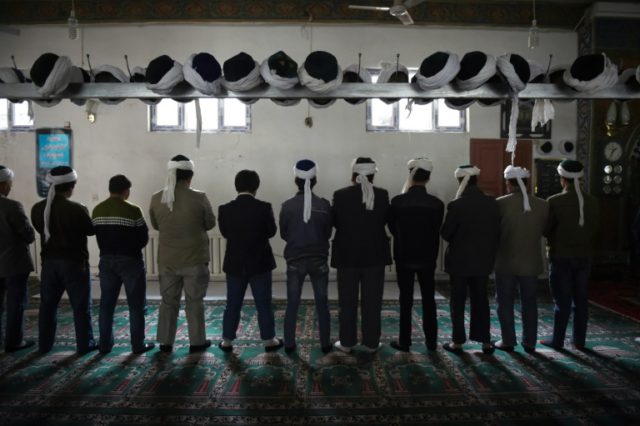China’s state-run Global Times newspaper praised the nation’s internment camps for Muslim ethnic minorities once again on Sunday, announcing that diplomats from Cuba, Venezuela, and other dictatorships will receive tours of the “vocational centers” to tell the world of their success.
The Communist Party of China began building internment camps in Xinjiang, the nation’s largest and westernmost province, in 2017 and flooded them with members of the nation’s Uighur, Kazakh, and Kyrgyz ethnic minority, all Muslims. Survivors of the camps say they endured physical torture, communist brainwashing, food deprivation, and forced learning of the Han majority’s Mandarin language. Many say they are forced to renounce Islam, eat pork, and drink alcohol.
China insists the camps are “vocational and education centers” where underprivileged minorities are learning job skills necessary to be competitive in the Chinese market. Relatives of those who have disappeared into camps, however, note that many of those missing are doctors, executives, and other highly educated individuals not in need of additional job training.
In the face of heightened international scrutiny from human rights NGOs, the U.S. State Department, and, most recently, the government of Turkey, the Global Times claimed that Beijing is proud of the camps and that a variety of government diplomats from around the world would soon tout the internment camps as a success.
“An official from Xinjiang confirmed the visit with the Global Times on the condition of anonymity on Sunday and said the diplomats are scheduled to visit vocational training and education centers in Kashi and Hotan, two cities in southern Xinjiang,” the newspaper reported. “The diplomats, from Pakistan, Venezuela, Cuba, Egypt, Cambodia, Russia, Senegal and Belarus, are visiting at the invitation of the Chinese Ministry of Foreign Affairs.”
The visits reportedly end on Tuesday, so the newspaper noted that no reports from the diplomats are expected until they return. The Chinese government has already allowed journalists from several countries to visit the camps, however, all of whom published favorable reports about the treatment of Muslims there. The Times claims that, in addition to state-controlled outlets like Russia’s TASS news agency, Reuters sent journalists to the tour.
Reuters’ reporting has referred to the camps as “gulags;” in December, the agency published evidence that China has built as many as 1,200 camps for a significant percentage of the nation’s Muslim population.
According to the Global Times, “inviting diplomats from other countries to visit Xinjiang Uyghur Autonomous Region in Northwest China shows that China is confident about showing its governance and achievements in counter-terrorism and de-extremism to the world.”
The tours began occurring after multiple reports revealed that Beijing had begun preparing the camps for international “inspections” by hiding evidence of indoctrination, torture, or slave labor.
China’s overtures to the international community, and particularly the Muslim world, to garner support for the camps has largely silenced most of the countries expected to protest. That changed last week, when Turkish Foreign Ministry issued a scathing statement demanding that China shut the camps down. Turkey has a particular interest in defending Uighurs because they are a Turkic people and Turks consider them part of the same larger ethnic group as them.
“It is no longer a secret that more than one million Uighur Turks incurring arbitrary arrests are subjected to torture and political brainwashing in internment camps and prisons. Uighurs who are not detained in these camps are under heavy pressure,” the Turkish Foreign Ministry asserted. “Our kinsmen and citizens of Uighur origin living abroad cannot get news from their relatives in the region. Thousands of children have been removed from their parents and became orphans.”
“The reintroduction of internment camps in the XXIst century and the policy of systematic assimilation against the Uighur Turks carried out by the authorities of China is a great shame for humanity,” the ministry concluded.
The Chinese Foreign Ministry responded by asserting that Turkey was being “irresponsible” and issuing a travel warning to Chinese nationals visiting the country. Nationalist Turks have, in the past, attacked individuals in Turkey perceived to be Asian in protest of the Chinese government, on some occasions targeting other Asians such as Koreans or ethnic Uighurs.
The nations sending representatives to the Xinjiang camps are largely enthusiastic allies of the Chinese Communist Party. Most, like Cambodia and Russia, are regional powers. The inclusion of two Latin American nations, Venezuela and Cuba, may raise eyebrows with some, as neither country has a significant Muslim population or a regional stake in the issue. Yet Venezuela and Cuba are two of China’s most reliable allies in the world.
China has invested billions in keeping the socialist dictatorship of Nicolás Maduro in Venezuela, offering extended credit lines to the bankrupt country in exchange for guarantees to its crude oil supply. Following the constitutional removal of Maduro from power in January, which Maduro continues not to recognize, the Global Times reported that the Maduro regime “will likely ship more oil to China and continue to pay its loans despite the negative influence of US sanctions on its oil production.” China blames sanctions on Maduro for human rights violations for the nation’s humanitarian crisis, not two decades of socialist mismanagement.
According to the Times, Maduro’s envoy in Beijing promised that Venezuela would “increase its oil production from 1 million barrels per day to 2.5 million barrels per day this year” to send to China.

COMMENTS
Please let us know if you're having issues with commenting.